The Global Learning and Observations to Benefit the Environment (GLOBE) Program is an international science and education program that provides students and the general public opportunities for contributing to data collection and the scientific process while better understanding the global environment.
GLOBE was launched worldwide in 1995 and today its international network has 110 participating countries including Costa Rica, which joined the program in 1998. Currently, 36 public schools are members of GLOBE Costa Rica. The Costa Rican GLOBE program has benefited 1,665 students and 72 teachers who have generated and registered more than 13,000 data points in GLOBE´s platforms.GLOBE is managed by NASA’s Earth Science Division whose Deputy Director is Costa Rica born Sandra Cauffman. Mrs. Cauffman had this to say about the program.
“NASA’s Earth Science Division is a proud sponsor of The GLOBE Program and is thrilled that Costa Rica is an active participant. The data collected by Costa Rican students and citizen scientists is valuable for NASA to help understand our home planet.”
I had the opportunity to converse with Evelyn Gonzalez, Coordinator of Communications and Marketing at the Omar Dengo Foundation, which manages Costa Rica’s GLOBE program.
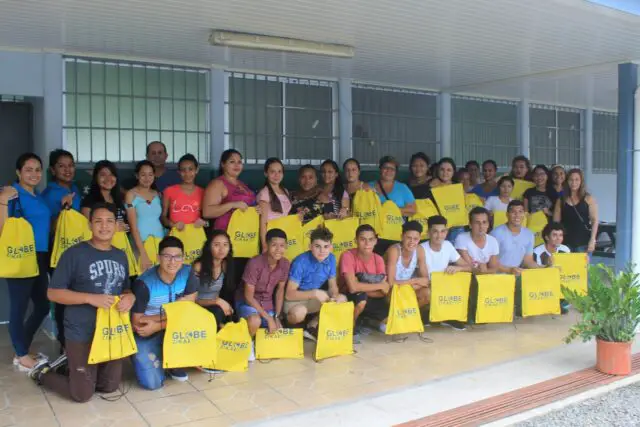
Please tell us about the history of the Globe program in Costa Rica and how it developed.
The Global Learning and Observations to Benefit the Environment (GLOBE) educational program started in Costa Rica in 1998 as a project directed by the Ministry of Public Education. In 2002 the Omar Dengo Foundation became the international partner in charge of the project.
GLOBE Costa Rica initially evolved in the form of science clubs in public secondary schools benefited by the National Program for Educational Informatics (PRONIE MEP–FOD) aiming to develop students´ scientific thinking skills through inquiry-based research projects that relate science with problems in the communities, giving special emphasis to water use. This was pursued through the Learning Activities in the GLOBE Program´s Hydrology section, GLOBE´s Hydrology protocols and the Watershed Dynamics materials.
The program´s key strategy was to train, guide and assist GLOBE teachers through constant communication, resource sharing, and the execution of at least two professional development workshops during each year. Training teams were made up of experienced FOD staff certified by GLOBE, as well as environmental and technical professionals from universities. PRONIE-MEP-FOD supplied during the period of 2002 -2014 the necessary scientific equipment, access to computer labs at secondary schools, and the funding for educational informatics teachers who dedicated four lessons per week to develop GLOBE activities.
During 2013, for example, GLOBE Costa Rica benefited 237 young people between 12 and 17 years of age who wanted to join these science clubs outside their regular school schedule. These clubs were offered then in 14 different secondary schools throughout the country with the support of 30 GLOBE teachers, 7 educational informatics advisors and 1 biologist.
From 2014 through 2017, FOD continued providing some advisory support to GLOBE Costa Rica certified teachers in secondary schools still active in the program. A listing of schools is available at the GLOBE Program web site https://www.globe.gov/es/web/costa-rica/.
Starting in 2018, FOD, in partnership with GLOBE Program, has implemented the GLOBE Zika Education and Prevention project as an effort to promote community involvement (citizen science) in the reduction of the habitat of mosquito larvae transmitters of diseases such as Malaria, Chikungunya, Dengue or Zika. (https://www.globe.gov/es/web/globe-mosquito-project/overview). The “Engaging citizens in the observation and prevention of the appearance of mosquitoes” initiative was carried out in September 2018 in the province of Limon, in the communities of Limon and Bataan, due to the highest incidence of zika, dengue and chikungunya reported by the Ministry of Health.
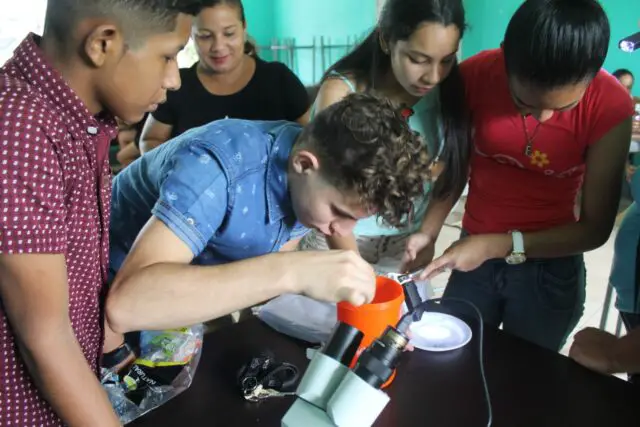
Currently, 36 schools are members of GLOBE Costa Rica. Historically, FOD partnership with GLOBE Program has benefited 1,665 students and 72 teachers who have generated and registered more than 13.000 data points in GLOBE´s platforms.
What have been GLOBE’S main projects and achievements in Costa Rica?
GLOBE Costa Rica has developed scientific thinking and interest in science among secondary school students through the fulfillment of research projects in hydrology that allowed them to relate science with environmental issues in their communities.
Through GLOBE, students were introduced to hydrology topics and learned and practiced the collection of environmental data using the scientific method during field trips. Students also learned to use a portable digital system (Xplorer GLX), bio-monitoring techniques and strategies to assess water quality.
Also, students developed positive attitudes toward the instruction and learning of science. Students reported their perceptions of being directly involved in collaborative learning environments as well a positive view of the learning relationship with their teachers.
Most of the participating public secondary schools are located in rural areas where the prospect of a scientific career is not common. GLOBE Costa Rica has been a significant opportunity for students to be in contact with scientific experiences. The project has served as a stimulus for them to think of their potential future involvement or career selection in scientific fields.
On July, 2018, students presented the project “Identification of populations of Culex, Anopheles and Aedes aegypti, using the application -Mosquito habitat mapper” at the scientific fair at the Liceo San Rafael, Alajuela. More than 100 students and educational authorities attended the presentation and the project won the first place in its School´s Circuit.
As part of the “Engaging citizens in the observation and prevention of the appearance of mosquitoes in Costa Rica” initiative on September 2018, FOD carried out an awareness campaign in the province of Limon to reduce the habitat of mosquito larvae that transmit malaria, chikungunya, dengue and zika in the cantons with the highest incidence in Costa Rica (counties of Limon and Bataan).
Six “Mosquito Workshops” were held with 83 participants who were homemakers, community leaders, members of the local Rotary Club, secondary school students, Boy Scouts, and other community members. Participants were trained on how to apply the Mosquito Protocol, use the Mosquito habitat mapper application, and register and upload data to the GLOBE´s website. The GLOBE Zika Education and Prevention project benefited183 people who were workshop and science fair participants.
How has GLOBE Costa Rica contributed to GLOBE’s regional and global objectives?
The different projects implemented by FOD in partnership with GLOBE have contributed with the regional and global GLOBE goals objectives in terms of:
- Development of student’s formal skills in scientific research and use of new technological tools.
- Strengthening students´ ability to perform research, specifically in the field of Hydrology.
- Promotion of the interaction of students and teachers with GLOBE´s international expert network through exchange knowledge and resources.
- Training events with both Costa Rican and international GLOBE participants, such as Hydrology workshops held by Master Trainers, GLOBE partner meetings and Scientific Environmentalism Symposiums
- Promotion of citizen science through the GLOBE Zika Education and Prevention project that produced high-quality data to help international scientists predict new outbreaks.
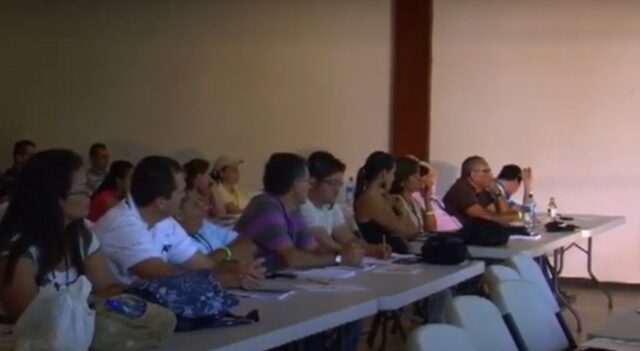
How can more Costa Rican teachers and schools get involved in the program?
GLOBE is a powerful science teaching and learning tool that enables students to understand the real nature of science and to become active citizens who report on environmental situations based on scientific evidence they have collected and analyzed themselves.
In order to involve more teachers and schools in the GLOBE Programs. it is necessary to provide training to help them understand the problem being investigated, why it is important, and how the research results can be of benefit to them and their students. It is important for teachers to know that they can be part of the research process, and of the solution.
Further resources and publications can be consulted here:
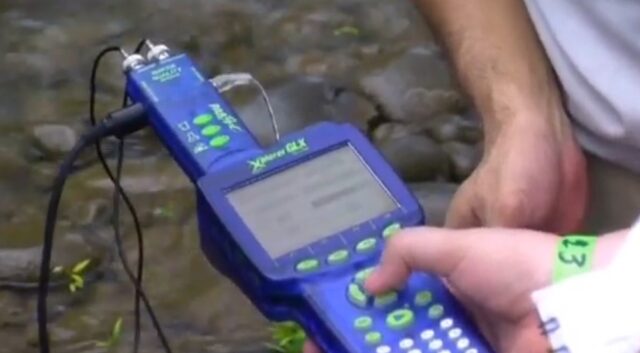
- Hydrology Protocols (Video playlist): https://www.youtube.com/playlist?list=PL43D366467251E1EE
- Stars and STEM Stories – GLOBE Costa Rica 2008-2016 https://bit.ly/33Y5VwL
- “The Costa Rica GLOBE (Global Learning and Observations to Benefit the Environment) Project as a Learning Science Environment”, by María Dolores Castro Rojas, Ana Lourdes Acuña Zuñiga and Emmanuel Fonseca Ugalde. Journal of Science Educational Technology (2015). DOI 10.1007/s10956-015-9547-7
- International Training Workshop Helps to Expand GLOBE in Costa Rica, Dec 06, 2016 https://bit.ly/35WIy9r
- GLOBE Hydrosphere investigation https://www.globe.gov/es/do-globe/globe-teachers-guide/hydrosphere
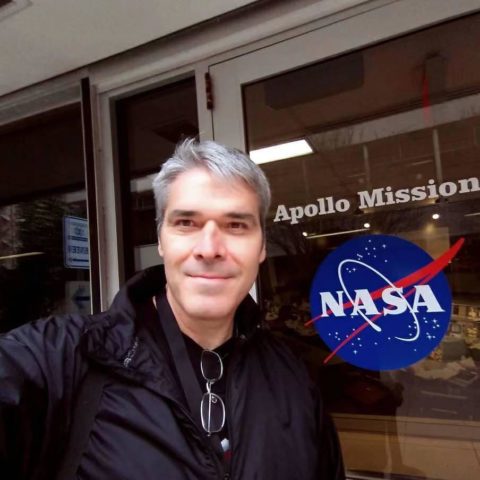
Bruce Callow is a Canadian teacher and co-author of the book To the Stars: Costa Rica in NASA. He does space education outreach work on behalf of NASA.
